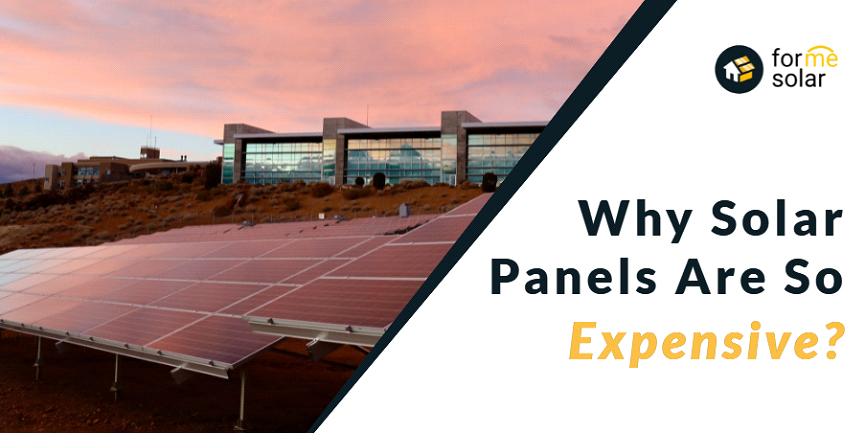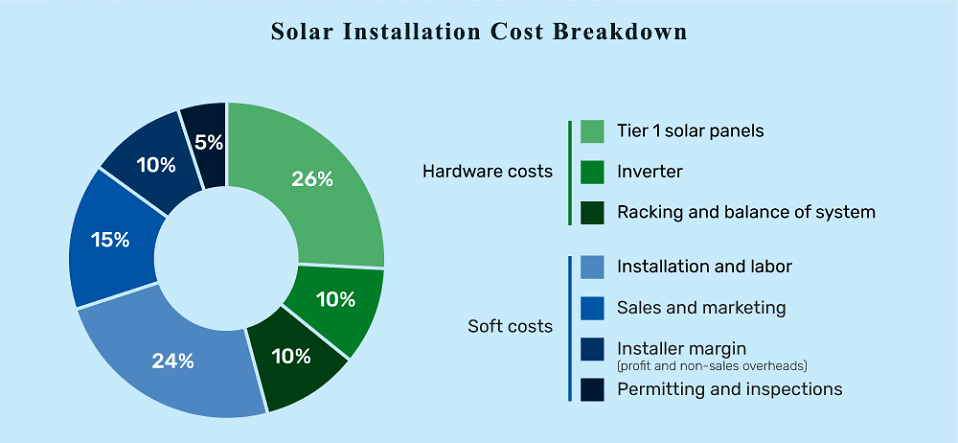
Why Solar Panels Are So Expensive?
You've probably considered installing solar panels on your home's roof at some point. However, if you've looked at its installation costs, you might be wondering why solar panels are so expensive. Well, you aren't alone.
Solar panels are expensive, but they offer several benefits. With tax credits, the ability to pay only for the electricity you use (net metering), and the benefits of renewable energy, a solar panel system can offer households and businesses power in novel ways.
Many of the world's wealthiest investors had to wait a long period of time for their investments to bear fruit. The same may be said about solar panels. Solar energy is the most cost-effective option to power your home in the long run. However, it necessitates a hefty upfront investment that will gradually pay you off over time.
Comparing the Costs and Benefits of Solar Panels
When comparing their initial costs, solar panels may appear to be more expensive than traditional diesel generators. Solar panels, on the other hand, operate with sunlight, which is a free energy source. They also require far less maintenance than other types of power-producing equipment. A diesel generator, on the other hand, is reliant on fuel delivery to remain operational. Maintenance is also more difficult since the generator is subjected to mechanical wear and high-temperature combustion.
In a nutshell, solar panels are more expensive than diesel generators if you only compare their upfront cost. But, when the overall ownership costs for the whole service life of the equipment are included, the balance shifts in favor of solar power systems. Solar panels can attain some of the lowest prices per kilowatt-hour generated since sunlight is free and maintenance requirements are minimal.
The cost of installing solar panels influences how well they will perform financially. Getting quotations from many solar companies is highly recommended to ensure you get the best deal possible. You should also get a full analysis of what the solar package contains to verify that there are no hidden fees such as permits or taxes.
How expensive are solar panels?
Sure, producing your own energy is a fantastic idea for a homeowner, but making your fantasies a reality may require some forethought and a little money. And know that the initial upfront costs for solar are equivalent to that of purchasing a new car.
According to the Solar Energy Industries Association, a typical house solar system now costs between $10,000 and $30,000, with the average installation costing approximately $18,000. That's a hefty investment by any standard, so why are solar systems so expensive?
Costs of Production
A solar panel is made up of a variety of materials and through a number of sophisticated and costly production procedures. The core component of a solar cell, for example, is comprised of silicon. Silicon is a commonly available material, but refining it to the point where it can be utilized in a solar cell is a complex process that necessitates precision technology.
A solar system is more than just solar panels. An inverter will be required to transform the produced electricity into a usable form. And if you want to utilize the electricity you create off-grid, you'll need batteries, which are pricey since they include rare minerals and components like lithium.
When copper cabling and all of the additional glass, metal, and man-made chemicals that go into a solar system are considered, it is evident that material expenses are enormous and inescapable.
What makes up the cost of a solar system?
The ultimate cost of a home solar installation is affected by a number of factors.
The costs are divided into two categories: hardware costs and soft costs.
- The average cost of a solar panel is 46 percent due to hardware. This includes solar panels, solar inverter(s), and system balance (racking and mounting, wiring, etc)
- Soft costs account for 54% of the average cost of a solar panel. Installation and labor costs, sales and marketing costs, permits and inspection fees, and installer profits are all included.
Another element that sometimes shocks customers is the percentage of soft costs in the overall cost of solar panels. However, when one considers the nature of solar panel companies and the installation operations they conduct, the number makes sense.
Each home is unique and necessitates a special design and installation. Solar enterprises demand employees with the necessary skills and certifications. And, like any other business, they must consider earnings, overhead expenditures, and marketing costs.
Below is a more specific breakdown of solar panel installation costs based on the national average solar panel installation cost of $2.49 per watt.
Cost breakdown for a 6kW solar system


*Cost before incentives
Soft costs, on the other hand, will likely be localized. Local pricing ranges for solar panel installation are determined by local regulations, construction permits, rentals, and tax incentives. The federal solar tax credit reduces the initial expenses of installing solar panels by 26%, resulting in income tax rebates if you install solar panels. These solar savings result in a Levelized cost, making solar panel systems a feasible financing alternative for clean energy.
However, if you want to make solar energy more affordable, you must reduce expenses for each aspect. Solar tax credits may only go so far.
Does the installation company affect the price?
Solar power companies frequently offer incentives in order to entice customers. These offers may have an influence on the final cost of home solar power installations.
Check with many installation companies to guarantee you receive the best deal. Remember that cheaper pricing may not necessarily imply a better value. Take the time to study evaluations and get a sense of the company's work quality before agreeing to work with them.
How much will I save with solar energy?
The savings from solar panels come in the form of much lower power bills. In the United States, the average yearly savings from a conventional 6kW solar panel installation is around $1,500.
Calculating your solar payback period is another method to look at savings. The payback period is the amount of time required to return your initial investment expenditures. After that, every watt of energy produced is a profit. The payback period for solar panels is currently 4-9 years in most jurisdictions.
However, it's important to remember that annual savings vary greatly from state to state, and even from house to house. The amount of money a household may save is determined by a variety of factors, including:
- The roof's size, orientation, and pitch
- The number of panels and their estimated energy output
- The number of hours of sunshine received on the property per day
- Whether or not a battery backup system is installed
- The cost of power in that specific location
Maximize your savings by getting the lowest panel costs, and quality solar installation workmanship. We will help you determine when your new household solar system will begin to pay you back.
Is going solar worth it despite the high cost?
Solar panels are, indeed, costly. With a typical 6kW system costing an average of $14,940, they are a considerable financial commitment in a home improvement.
Solar panels, on the other hand, have the potential to save you thousands of dollars over the life of the panels, in addition to providing energy independence and ecologically benign renewable energy.
Furthermore, the high upfront costs do not have to be an impediment: most solar companies collaborate with lending providers to give a variety of financing solutions.
If you haven't already, receive a solar cost and savings estimate to determine if the math works for you.















